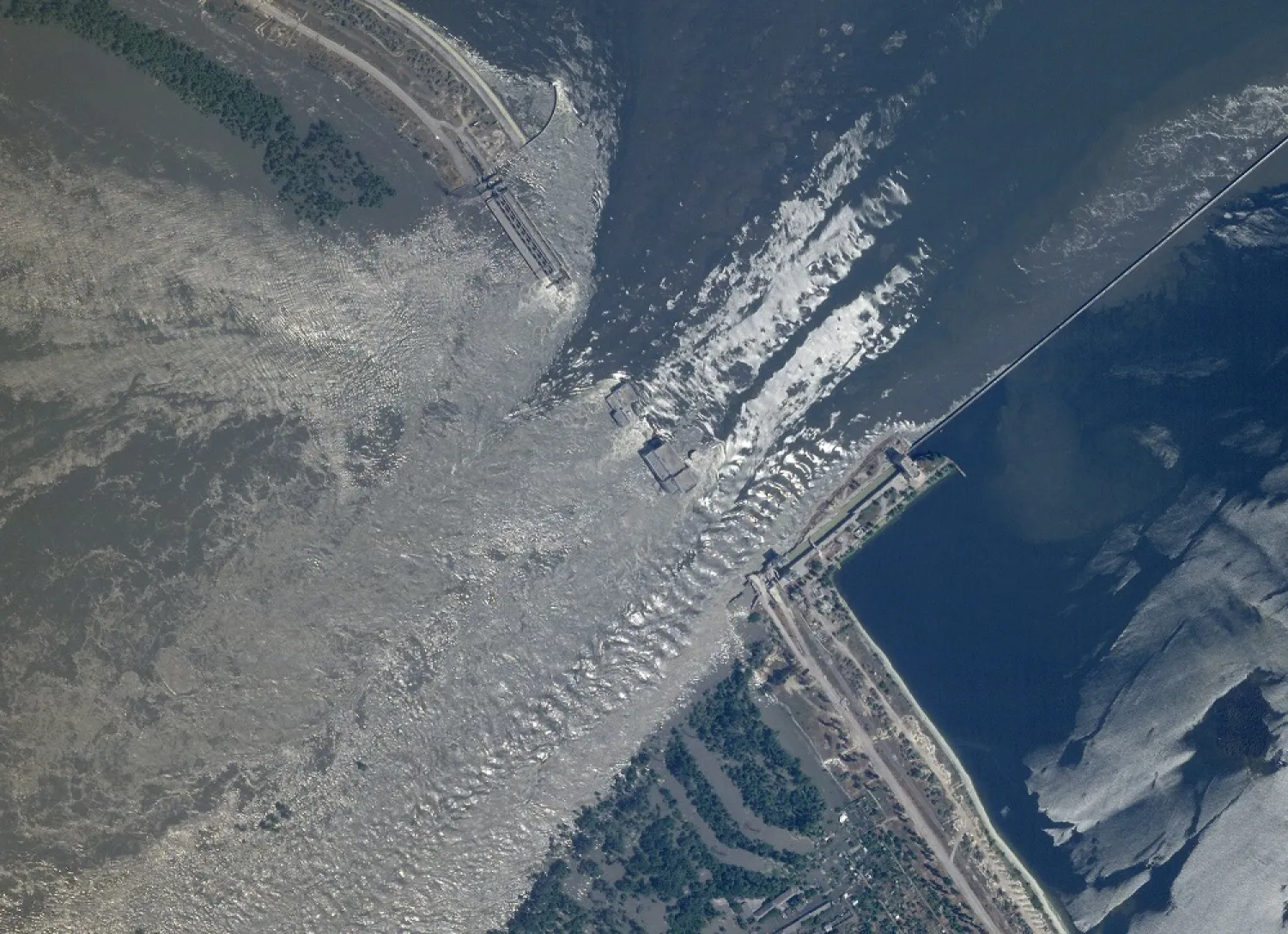A torrent of water burst through a massive dam on the Dnipro River that separates Russian and Ukrainian forces in southern Ukraine on Tuesday, flooding a swathe of the war zone and forcing villagers to flee.
Ukraine accused Russia of blowing up the Nova Kakhovka dam in a deliberate war crime. The Kremlin said it was Ukraine that had sabotaged the dam, to distract attention from the launch of a major counteroffensive Moscow says is faltering. Some Russian-installed officials said the dam had burst on its own.
Neither side offered immediate public evidence of who was to blame. The Geneva Conventions explicitly ban targeting dams in war, because of the danger to civilians.
By mid-morning in the city of Kherson in Ukrainian government-controlled territory downstream from the dam, a pier on a tributary of the Dnipro had already been submerged.
Lidia Zubova, 67, waiting for a train out of the city after abandoning her inundated village of Antonivka, told Reuters: "Our local school and stadium downtown were flooded... The road was completely flooded, our bus got stuck."
Ukrainian police released video of an officer carrying an elderly woman to safety and others rescuing dogs in villages being evacuated as the waters rose. Interior Minister Ihor Klymenko accused Russia of shelling areas from where people were being evacuated and said two police officers were wounded.
On the Russian-controlled bank of the Dnipro, the Moscow-installed mayor of Nova Kakhovka said water levels had risen to 11 meters (36 feet). Residents reached by telephone there told Reuters that some had decided to stay despite being ordered out by occupying Russians.
"They say they are ready to shoot without warning," said one local man, Hlib, describing encounters with Russian troops. "If you come a meter closer than allowed, they immediately start yelling obscenities. We're still allowed to go to the store, but we don't know what orders will be given next."
Yevheniya, a female resident, said the water was up to the knees of the Russian soldiers walking the main street in high rubber boots. "If you try to go somewhere they don't allow, they immediately point their machine guns at you," she said. "More and more water is coming every hour. It's very dirty."
The Kazkova Dibrova zoo on the Russian-held riverbank was completely flooded and all 300 animals were dead, a representative said via the zoo's Facebook account.
The dam supplies water to a wide area of southern Ukrainian farmland, including the Russian-occupied Crimean peninsula, as well as cooling the Russian-held Zaporizhzhia nuclear plant.
The vast reservoir behind the dam is one of the main geographic features of southern Ukraine, 240 km (150 miles) long and up to 23 km (14 miles) wide.
An expanse of countryside lies in the flood plain below, with low-lying villages on the Russian-held southern bank particularly vulnerable.
'Terrorists'
The dam's destruction raised fears of a new humanitarian disaster in the center of the war zone and transformed front lines just as Ukraine prepared to launch a long-awaited counteroffensive to drive Russian troops from its territory.
Russia has controlled the dam since early in its 15-month-old invasion, although Ukrainian forces recaptured the Dnipro's northern bank last year. Both sides had long accused the other of plotting to destroy the dam.
"Russian terrorists. The destruction of the Kakhovka hydroelectric power plant dam only confirms for the whole world that they must be expelled from every corner of Ukrainian land," President Volodymyr Zelenskiy wrote on the Telegram messaging app.
Russians had "carried out an internal detonation of the structures" of the dam, Zelenskiy said. "About 80 settlements are in the zone of flooding."
NATO Secretary-General Jens Stoltenberg called it "an outrageous act, which demonstrates once again the brutality of Russia's war in Ukraine".
Kremlin spokesman Dmitry Peskov blamed "deliberate sabotage by the Ukrainian side".
"Apparently, this sabotage is also connected with the fact that having started large-scale offensive actions two days ago, now the Ukrainian armed forces are not achieving their goals."
Earlier, Russian-installed officials had given conflicting accounts, some saying the dam had been hit by Ukrainian missiles overnight, others saying it had burst on its own due to earlier damage.
Zaporizhzhia nuclear plant
The UN nuclear watchdog said the Zaporizhzhia power plant, upriver on the reservoir's Russian-held bank, should have enough water to cool its reactors for "some months" from a separate pond, even as the huge reservoir drains out.
Video showed water surging through the remains of the dam - which is 30 meters (yards) tall and 3.2 km (2 miles) long.
Some 22,000 people living across 14 settlements in the Kherson region are at risk of flooding, Russia's RIA news agency quoted the Moscow-installed head of the region as saying.
The Russian-installed governor of Crimea, Sergei Aksyonov, said there was a risk that water levels in the canal that carries fresh water to the Black Sea peninsula could fall. Crimea, which Russia has held since 2014, had sufficient water reserves for now and the risk would become clear in coming days.
Zelenskiy said in an interview published on Saturday that Ukraine was poised to unleash its much-heralded major counteroffensive, using newly supplied Western battle tanks and armored vehicles.
Moscow has said the Ukrainian offensive began on Sunday and claimed to have repulsed a third day of Ukrainian advances.
Kyiv has maintained deliberate ambiguity about it though Zelenskiy hinted at successes. In an evening address before the dam broke, he hailed "the news we have been waiting for" claiming forward moves around Bakhmut, a ruined city Russia captured earlier this month.
Russia also carried out a fresh wave of overnight air strikes on Kyiv. Ukraine said its air defense systems had downed more than 20 cruise missiles on their approach to the capital.
The Shebekino district of Russia's Belgorod region near the Ukrainian border came under renewed shelling, local authorities said. Anti-government Russian fighters based in Ukraine claim to have captured villages there.









